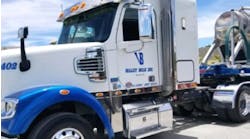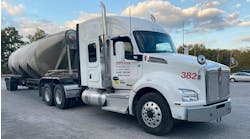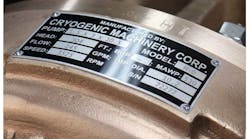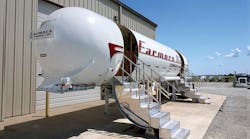BeyondTrucks expands integration hub
PSG acquires cryogenic pump manufacturer
Farmers Oil builds driver loyalty with classy tractors, plenty of loads, and lots of miles
PLENTY of companies say they treat their employees like family. Relatively few actually do.
Farmers Oil Company Inc is one of those where the owners truly mean what they say. For instance, drivers laying over for their 34-hour restart period at the trucking company’s main terminals in Anthony, Kansas, and Afton, Oklahoma, are invited to spend the downtime at the owners’ homes.
“It’s all about trust,” says Jeremey Graves, general manager based at the Anthony terminal. “If I can’t trust you to stay at my house, you can’t work for this company. Trustworthiness is something we look for in every person we hire.”
It’s also part of our promise to provide our customers with the best possible service. Our customers know that they can call us at any time—day or night—and we will respond. They know we will do what we say we are going to do, and we will do it on schedule.”
Three generations
Along with his father, Larry Graves, the owner of Farmers Oil, Jeremey manages a diversified trucking company. In all, three generations of the Graves family have been involved in the operation, and members of the fourth generation are in the wings.
In business for more than 40 years, the company has undergone plenty of change, diversification, and growth. Ray Graves, Larry’s father, started in the late 1960s as a small exempt produce hauler. In the 1970s, Larry drove for his father before starting his own company—Larry Graves Trucking, also an exempt produce hauler.
In 1976, Ray bought Farmers Oil Company, the Standard Oil dealer in Anthony, which had three petroleum bobtails and a gasoline transport. Gradually, he shifted his focus from produce to fuel distribution, and he began looking for opportunities to expand as a petroleum hauler.
Ray added propane delivery service, and he started hauling propane from a local refinery with his own propane trailer. Soon he was hauling all of the propane produced at that refinery. By 2000, when Larry bought Farmers Oil from his father, the fleet consisted of roughly 30 trucks and 50 trailers.
Diverse operation
Today, the retail petroleum distribution side of the business is no more. Just two refined fuel trailers remain from those days. Farmers Oil Company is thriving as a diversified tank truck carrier with 115 tractors and 220 trailers.
“The refined-fuels business was tough,” Larry said. “Our core customers played a big role in helping us move into a more varied range of cargoes. We embraced the opportunities because we saw this as a way to keep our drivers busier throughout the year.
“Truck driving is a hard life, and drivers won’t stay with you if they aren’t making money. A busy driver is a happy driver.”
Cargo diversification helped fuel the fleet growth. LP-gas remains a critical part of the business, but the carrier also transports natural gas and natural gas liquids, including natural gasoline.
“We’re a premier transporter of these products,” Larry says. “We offer our customers year-round service, and we have the ability to respond quickly to handle higher seasonal demands.
“Sixty to 70 percent of these cargoes are used as feedstocks. For instance, natural gasoline is blended with refined fuels to raise the octane level. It is also blended to heavy crude oil to make it sweeter.”
Ag products
On the agricultural product side, Farmers Oil transports a lot of anhydrous ammonia for both agricultural applications and use in industrial scrubbers at power plants and other operations.
“We transport liquid fertilizers and pesticides, many of which are listed as hazardous materials,” Larry says. “In fact, 90% of our cargoes are chemicals and/or hazmat. We’re hauling calcium chloride, and we have had good success transporting diesel exhaust fluid. More recently, we have expanded into molten sulfur shipments.
“While these cargoes are hauled in tank trailers, we found that some customers also use IBCs (intermediate bulk containers). We use van trailers and tarp-sided trailers we call Conestogas to transport the IBCs. We also haul some airplane parts and jet engines.”
The type of equipment used varies by the seasons. Tank shipments predominate in the winter months. For instance, butane moves in large volume from September through May. More of the dry freight is handled in the summer months.
Tank transport activity is concentrated in the center of the country, and most trips are out and back within a couple of days. A 500-mile round trip is typical.
On the dry freight side, Farmers Oil drivers run all over the continental United States. “Typically, they stay out through one 34-hour break, and are home every two weeks,” Jeremey says. “Unlike the tanks, which are loaded only about half the time, dry freight trailers have just a 7% deadhead rate.”
Busy fleet
The job of keeping the fleet busy falls on the dispatchers at the Anthony terminal. Dispatchers use McLeod software to coordinate and track shipments. Customers receive status reports twice a day.
Drivers communicate with dispatchers through Omnitracs on-board computers. On-board capabilities have been enhanced with in-cab scanners for bills of lading and other paperwork. “We can send delivery paperwork to our customers at the time of delivery,” Jeremey says.
High productivity throughout the year helps Farmers Oil achieve an impressively low driver turnover rate of 5% to 10%. It also helps attract the new drivers needed to keep the fleet growing to keep up with customer demand.
To be considered, a driver must be at least 25 years old and have a minimum of three years over-the-road truck driving experience. Jeremey conducts the road test for each driver applicant.
“We look for someone who has good driving skills, and a good attitude about safety,” Jeremey says. “Applicants have to be able to shift an 18-speed manual transmission, because that is all we run in our fleet. Finally, I’m looking for someone who will be happy working here. After all, it costs around $7,000 to train a new driver, and we want them to stay.”
Fitness and range-of-motion testing is done at a hospital in Wichita, Kansas. The testing is tailored to the trucking workplace.
A week-long orientation takes place at the Anthony terminal and covers company policies, DOT-mandated hazardous materials training, and electronic driver log paperwork. This is followed by three weeks of on-the-job training with a veteran driver.
“During the OJT, the new driver and the trainer each drive a transport and the new driver loads and unloads both trailers,” Jeremey says. “We stress the importance of making sure the tank is fully emptied at the delivery location.
“We actually prefer to hire drivers who have no tank truck experience. We want to show them our way of doing things without having to change ingrained habits.”
Distinctive trucks
One thing new drivers realize well before they climb into a Farmers Oil truck to haul their first load is that the carrier runs some of the most attractive and distinctive tractor-trailer rigs on the highway. Each tractor looks almost custom-built, and there is some truth to that.
“We spec equipment that looks good and performs well,” Jeremey says. “I would never buy a truck that I wouldn’t drive myself. I believe that is one of the things that helps with driver recruiting and retention.”
Most of the tractors have custom paint schemes, and about 20% were refurbished with glider kits. “We build our own glider kits at our shop in Afton,” Larry says. “We do about four a year. Using a glider kit gives us a lower tare weight and a means of extending the life of a tractor through regular rebuild.”
On its current schedule, Farmers Oil adds two new tractors a month for replacement and growth.
Most of the tractors in the fleet are long-nose Peterbilt Model 389s with 72-inch flat-roof sleepers. The glider kits have 550-horsepower rebuilt Caterpillar engines, while new tractors come with 565-hp Cummins X15 engines. All of them have Eaton Fuller 18-speed manual transmissions.
“With our powertrain spec, our better drivers can achieve almost six and a half miles per gallon in fuel economy,” Jeremey says.
Specifications also have been refined to trim as many pounds as possible from tractor tare weight. The carrier runs wide-base Michelin tires in the drive positions (and also on the trailers). Aluminum components include the fifthwheel, frame crossmembers, bell housing, and wheels.
“We run all Michelin widebase tires,” Larry says. “We run the tires in the drive positions for 140,000 to 150,000 miles and then move them to the trailers. We fill all of our tires with nitrogen and we avoid tire pressure problems due to temperature changes.”
The trailer fleet includes 150 MC331 pressure vessels with a 10,600-gallon capacity. Most were built by Mississippi Tank, but the carrier also runs a few from Westmor. Tank equipment includes an emergency shutdown system from Base Engineering and Blackmer product pump. Hendrickson Intraax axle/air suspension systems are specified on all new trailers.
Mac Trailer has been the primary supplier of 10,000-gallon DOT407 stainless steel tankers used for hazardous materials. Non-code 5,600-gallon stainless steel tanks are used for liquid fertilizer and diesel exhaust fluid.
Maintenance operation
Farmers Oil has built an extensive fleet maintenance capability that includes shops at all three terminals in Anthony Valley Center, Kansas and Afton.
The four-bay Anthony shop has two mechanics and the six-bay Valley Center shop employs three mechanics. Those two shops focus on routine preventive maintenance.
The shop in Afton is the showpiece of the fleet maintenance program. Operating under the name Route 66 Truck & Trailer, the Afton shop has 12 full-service bays. A registered commercial cargo tank repair facility, it has an R-stamp and specializes in MC331 pressure vessels.
With a crew of 18 technicians, the shop handles all in-service work on new tractors for the Farmers Oil fleet, as well as glider kit assembly. Shop facilities include an 84-ft paint booth with plenty of room for tractors and trailers.
On the tank repair side, code welders are on staff to handle any necessary barrel repairs and modifications. The shop has full tank inspection and testing capabilities.









